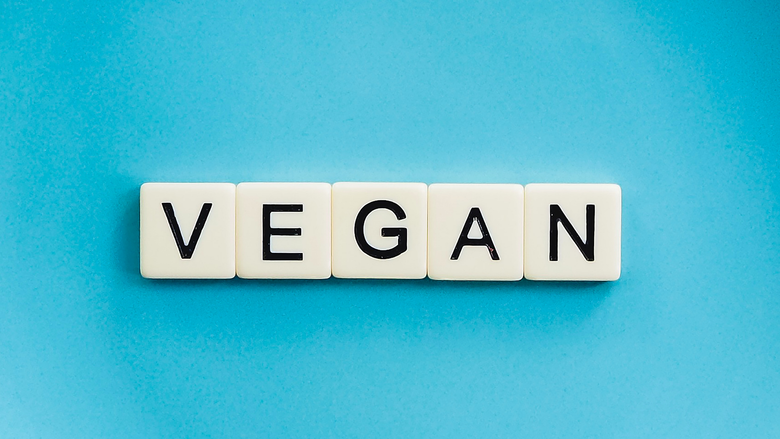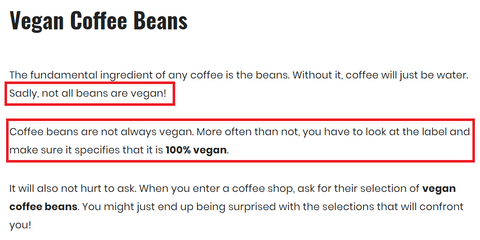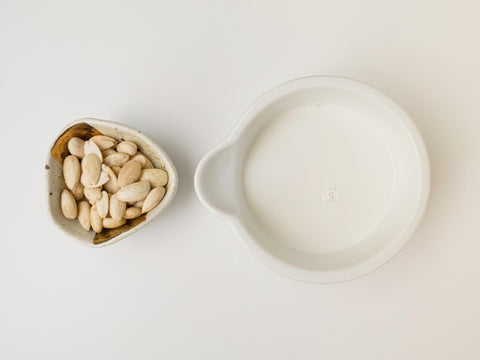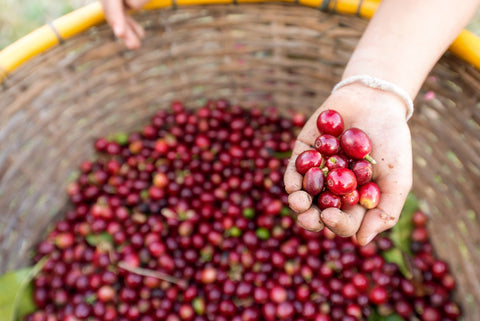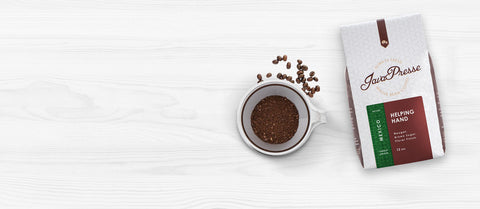It’s amazing how much completely wrong information there is on vegan coffee out there.
Companies using deceptive marketing. Blogs trying to get you to buy weird products so they can get a commission. It’s hard to know what’s true and what’s not.
Let’s take an honest, transparent look at a few questions.
- Can vegans drink coffee?
- Are there some kinds of coffee vegans shouldn’t drink?
- What about vegan coffee creamers?
We’ll answer these, but first, let’s be clear about a couple of things.
Veganism is the practice of not using or eating animal products, or products created by using animal products. Essentially, no animals are allowed in manufacturing.
The vegan lifestyle is about more than just avoiding animal products. It’s about choosing foods and products that are ethically sourced and created. It’s about living sustainably so our planet, animals, and humans can thrive together.
So let’s talk about vegan coffee…
Beans Marketed As Vegan Coffee Are… A Scam (Sort Of)
Marketing coffee beans is hard, so some companies use less-than-honest tactics to make them sound special (see our post on the weight loss coffee scam).
It’s also true for vegan coffee.
There is no such thing as “vegan coffee” because, well, all coffee is vegan. Coffee beans are roasted seeds of a plant. There’s no animal involved from start to finish—not even animal by-products.
Can vegans drink coffee? The answer is always “Yes!” Should vegans drink any coffee? That answer is more complicated (more on this later).
But, of course, you can’t trust everything you read on the internet.
For example, we Googled “vegan coffee” and found this gem on the first page…
Yikes!
(Can you guess what phrase is big and bold on that company’s coffee bag?)
Here’s what’s up… you don’t need to look for the phrase “100% vegan” on a coffee bag. You don’t even need to look for “vegan coffee” at all.
Just enjoy your regular coffee—it’s 100% vegan 100% of the time.
(But if you’re really invested in vegan values… keep reading. There’s more to the story).
Read: Searching For Certified Organic Coffee - Is It Worth It?
How To Identify Vegan Coffee Creamers And Milks
Black coffee is always vegan, but dairy-based milks and creamers are a no-go.
So instead of reaching for the rich 2% or classic coffee creamer, try one of these plant-based alternatives.
- Almond Milk — A classic nut milk with a thin and velvety body and a subtle nutty, semi-sweet flavor.
- Cashew Milk— Thin but super-creamy, this milk is especially great for steaming, is nutritionally dense, and has a hint of nutty flavor.
- Macadamia Milk — A somewhat surprising fruity subtlety is present in this thick and smooth nut milk. Definitely worth a try.
- Flax Seed Milk — This nutritious milk has an earthy-nutty tone that amplifies similar flavors in coffee. On the thin side, akin to cashew milk.
- Hemp Milk — Somewhat thin, yet still creamy, hemp milk has a slightly nutty flavor that’s very similar to almond milk.
- Oat Milk — Naturally sweeter and thicker than most vegan milks, so it’s no surprise it has become a barista favorite in recent years.
- Rice Milk — This light milk has a translucent appearance and a subtle-sweet flavor. It’s great for people who want to avoid nuts.
- Soy Milk — Soy milk is nutritionally dense, having almost as much protein as dairy milk. It’s creamy and balanced, though the flavor can vary from brand to brand.
- Coconut Milk — This plant-based milk is rich and creamy, but tends to have a distinct taste that can stand out. Some people love it, but it’s not for everyone.
- Pea Milk — Yes, it’s a thing! And it’s the most nutritious vegan milk of them all. Features a neutral flavor and a soy/almond milk consistency.
Read: Fair Trade VS Direct Trade Coffee: Which Is Better For Coffee Sustainability?
Any of these vegan milk alternatives is safe to use in their most basic version—just make sure that flavored versions (chocolate or caramel, for example) don’t include animal by-products (uncommon, but does happen).
As long as you’re going with a plant-based milk or creamer, you really have nothing to worry about.
Why Vegans Don’t Want To Buy Any Bag Of Coffee Beans
So here’s the thing. Veganism is more than simply avoiding animal products.
It’s about living ethically, pursuing the good in products you buy. It’s about caring for our planet, for creatures, and humans in a way where we can all prosper together.
And that’s why not all coffees are vegan-friendly (even if they’re all technically vegan).
Coffee beans that are grown with harmful chemical pesticides, damage natural ecosystems, and sold at such a low price that they leave their farmers in poverty do not align with vegan values.
Read: 3 Reasons Buying Cheap Coffee Is Bad For The World
That’s why we were shocked to find low-quality, cheap coffee being labeled as “vegan” when we were looking around Google.
Cheap coffee (under $14 per bag or so, usually from the grocery store) keeps coffee farmers from turning a profit, which means they don’t have the financial security to improve their farms to be more sustainable or ethical.
It’s why we need coffee charities that help farm workers access education and healthcare. And it’s why we need ethical coffee roasters who give back to their farm partners.
Coffee that is truly vegan-friendly will support ethical supply chains that empower farmers to support themselves.
That’s what we’re doing at JavaPresse. The stories are stunning.
Some of our farmers in Colombia used to grow cocaine but wanted out of the drug trade—now they earn more growing coffee. The first all-women cooperative in Guatemala was able to pay for women’s healthcare (which is very unusual in the rural countryside).
By supporting farmers who want to make their coffee—and their communities—better, we’ve been able to encourage positive impact around the world.
Now that’s vegan-friendly coffee!
And we’d love for you to join us.
When you join the JavaPresse Coffee Club, you’re going to taste beans from farmers who not only love coffee, but the Earth too. Sustainable coffee growing means a healthier planet, better wages, and happier farmers.
And when farmers are free to put their whole hearts into their beans, the results taste magical.


